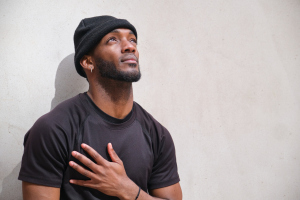3 reasons we all need to tell and hear stories

The Odyssey. Uncle Tom’s Cabin. Don Quixote. For as long as people have been around, so has a love of story. Over the years, oral storytelling morphed into written and then digital format, and now all three forms hold incredible potential to teach us more about ourselves, others and the world around us.
The best stories are always the ones that speak to us personally — those that teach us more about who we are and why we do what we do. We enter others’ stories as listeners and learners and find pieces of ourselves and humanity scattered throughout.
First working in a church context and now in the Bible translation movement, I have seen and experienced the power of story, particularly what happens when we are singularly attuned to what we are hearing.
Let me share an example. One night in a dream, God prompted Lee, a translator in Cameroon among the Hdi people, to look for the Hdi word for love. Lee and his wife had learned that verbs in Hdi consistently end in one of three vowels: i, a and u. But when it came to the word for love, they could only find i and a. Dvi meant that you loved something, but now that love was gone. Dva meant that love was conditional and depended on the person’s actions.
When Lee asked his translation committee about dvu, everyone laughed. Their response was chilling: “That would mean,” they said, “that the love was unconditional and lasted forever. It just doesn’t exist!” they said.
Lee paused and then responded: “Could God dvu people?” After complete silence and many tears, the committee members asked, “Do you know what this would mean? This would mean that God kept loving us over and over, millennia after millennia, while all that time we rejected his great love.”
For centuries, the little word dvu was there. It was unused, but it was available. When the word was finally spoken, everything changed as the Hdi community began to understand the true nature of God and the implications for them as people made in His image.
I love telling stories, and I love hearing stories, and over the years, I have become convinced of at least three reasons why we all need stories in our lives.
First, as we listen to stories, we see things in new ways.
Many of us today are distracted by so many things. We are distracted by technology, our to-do lists and our packed schedules. Deep down, we have the desire to slow down and be more attentive and aware of the moment. Unfortunately, these distractions also hinder us from learning, growing and feeling connected to God and others.
One of the best things we can do for ourselves and others is to give our time and attention without distraction. As we slow down and listen to others, we honor the image of God in them, and sometimes we even hear things that God wants to teach us.
We can read the story of how a new way of seeing God’s love changed a community in Cameroon, but when we slow down long enough, we may find more. We can ask ourselves: How does this type of unconditional love and compassion also impact how we see God and those around us? This kind of personal reflection has the potential to change how we think and live.
Second, as we tell stories, we unearth hidden gems for others to mine.
Some people are naturally gifted storytellers. Great storytellers will have you on the edge of your seat, desperate to hear how things will turn out. While everyone loves a good storyteller, not everyone is good at it. Regardless of how natural this comes for us, every time we tell our stories, we become more connected to those around us and allow God to use us for his purposes.
On a personal level, I believe this to be true when I tell my own stories of family, friends, travels, vulnerabilities or what God is teaching me. If God desires to use what we have learned and experienced to encourage others (and I believe He does), then we must be willing to engage in storytelling where God has placed us. This, of course, can take many forms like talking over coffee with a friend, writing a book, composing a song, etc. The stories God has birthed in us matter however they are told.
Third, through stories, we often find intersections with God’s most important Story.
God is the best storyteller of all. Jared Wilson says it well in his book The Storytelling God: “Only God can write a story that resonates not just in the power of the imagination or the heart or the mind, but in the very soul; only God can write a story that brings dead things to life.”
For followers of Christ, the Gospel is the most important story ever told and heard. It is the story that every other story hinges upon. Those of us in the Bible translation movement have dedicated our lives to the mission of seeing the Gospel come to fruition in the hearts of every person on earth. The story of that little word dvu is powerful, but what is even more so is what has resulted from that among the Hdi alone. Today, more than 50,000 Hdi speakers can understand the unconditional love that God displayed when He sent His son Jesus to earth.
I wonder, however, how this story can encourage even those of us in the West to lean into what it means for us and for those who aren’t yet followers of Christ to truly believe in the unconditional love of God. Maybe some of us believe that this kind of love just doesn’t exist — but it does! For me, the story of the Hdi people reminds me anew of how breathtaking it is that God keeps “loving us over and over.”
That’s a story worth telling. And so, too, are all the others that stem from your heart and mine. Such a great storytelling God deserves to have children like you and me who will both give and receive all that we can through the gift of story.
Kelly Chesnut is the director of spiritual development at Wycliffe Bible Translators, USA. She is co-author of the new book Deeply Rooted: Stories of Lives Rooted in Scripture.



























